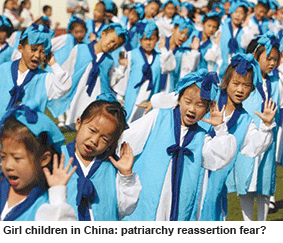 China’s one-child policy, perhaps the biggest attempt at social engineering in history, came to an end in 2015. Under pressure from an ageing population, the authorities announced last October that couples would be allowed to have two children, scrapping a policy strictly implemented since 1979.
China’s one-child policy, perhaps the biggest attempt at social engineering in history, came to an end in 2015. Under pressure from an ageing population, the authorities announced last October that couples would be allowed to have two children, scrapping a policy strictly implemented since 1979.
It was widely credited with having prevented 400 million births, although this claim has been challenged by scholars who traced it back to a Chinese government study of the late 1990s. A number of demographers have argued that birth rates would have automatically come down with rising prosperity — as they have in other countries — regardless of state intervention.
Whatever the overall impact was, it did usher in an age of families without boys in a society where many parents traditionally kept trying for more children until they had a son. These girls did not have to compete with brothers for resources and attention, and so were able to blaze a trail through China’s universities, according to a paper by Ye Liu, senior lecturer in international education at Bath Spa University, UK.
Statistics back this up. According to Women Rising as Half of the Sky? An Empirical Study on Women from the ‘One-child’ Generation and their Higher Education Participation in Contemporary China, which surveyed about 1,000 undergraduates at universities in the eastern provinces of Anhui and Zhejiang, singleton female students did substantially better than those with siblings. They performed far better in the gao kao, China’s university entrance test, and were much better represented at “elite” universities. Singleton girls were also more likely to choose arts, humanities or social science subjects.
But now that the one-child policy is over, could Chinese patrilineal culture reassert itself, and sisters lose out to brothers in the fight for higher education? Few expect a baby boom after the end of the policy. “Due to the high cost of property, education and childcare in urban areas, it’s very difficult to afford another child,” says Liu.
But those parents who do take advantage of the policy’s demise could revert to older customs, she fears. “If both boys and girls pass the (university entrance) exam, then they would prioritise the boy,” she predicts.
Such discrimination is already happening when it comes to property. Leftover Women: The Resurgence of Gender Inequality in China, a book published in 2014, explores misogynist pressure on educated women to marry — lest they become “leftover” — and the widespread prioritisation of sons over daughters when parents contribute savings towards a marital home.
According to the author Leta Hong Fincher, a visiting assistant professor at Columbia University, it is “certainly a possibility” that this pattern could replicate itself when it comes to higher education costs, although it’s impossible to know for sure. Furthermore, there’s now “a tremendous backlash against women in higher education”, she says. “The government sees the success of women… as a problem for male students.”
Impediments to female success in Chinese universities are being debated in China itself. In a recent paper, Wang Liming, a professor of life sciences at Zhejiang University, found a pattern that will be familiar to those in the UK or the US: women in science were progressively less represented at higher levels. The research also appears to reveal troubling attitudes from male science professors. They tended to see their male students as having more ability and enthusiasm for their work (female professors observed no such gender difference).
For Liu, even though women have successfully broken into higher education, parental expectations still hold them back. “Parents still have much higher expectations of boys,” she says, which stymies female graduates’ future careers. And successful women of the one-child policy generation often told her: “My parents treated me as if I was a boy.”